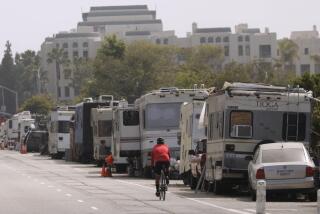Editorial: Whose job is parking reform?
Anyone who has driven in Los Angeles knows the frustration of dealing with its broken parking meters, sparse parking spots and occasionally inane parking rules (assuming they were lucky enough to find a parking spot at all). So California Assemblyman Mike Gatto (D-Los Angeles) will no doubt find a lot of fans for his grandiosely named “California Parking Bill of Rights.”
Under Gatto’s reform package, cities around the state would be prohibited from ticketing motorists who park at broken meters. A 2013 state law, authored by Gatto, already covers this, but it is due to expire at the end of this year. Gatto’s law also bars valet-parking operators from commandeering metered parking spots, requires cities to free up parking spaces as soon as street sweeping is done (rather than having hours-long restrictions on street-sweeping days), and mandates that cities with high-tech “smart” meters allow the price at the meter to vary by time of day and demand for spaces.
But as reasonable as some his proposed reforms are — of course no one should be ticketed because they couldn’t feed a broken meter — these rules and regulations of street parking are not issues for the state legislature. They’re classic local issues which different cities might want to handle differently. And if problems arise, they’re best fixed by local governments. Most members of the Los Angeles City Council opposed Gatto’s 2013 bill restricting ticketing at broken meters, arguing he had overstepped into the realm of local lawmaking. They were right.
Interestingly, L.A. had been ticketing at broken meters, on the dubious argument that not doing so created an incentive for motorists to break them. But the council changed that unpopular (and unreasonable) policy after the Gatto bill passed. In other words, Gatto successfully forced the city’s hand.
In the last few years in Los Angeles there has been such an outcry over confusing parking regulations and increases in parking fines that Mayor Eric Garcetti created what he calls the Parking Reform Working Group, which delivered a report last year on how to reform the system. Councilman Mike Bonin incorporated a number of its suggestions into several motions that are now winding their way through council committees.
But the city needs to get moving on this. The working group was formed in June 2014 and reported back last February, yet none of its changes have been implemented to date. No wonder it seems like good politics for Gatto to declare himself the defender of drivers’ “rights.” Nevertheless, the fact remains that City Hall is the place to enact any parking reforms for city streets.
Follow the Opinion section on Twitter @latimesopinion and Facebook
More to Read
A cure for the common opinion
Get thought-provoking perspectives with our weekly newsletter.
You may occasionally receive promotional content from the Los Angeles Times.










